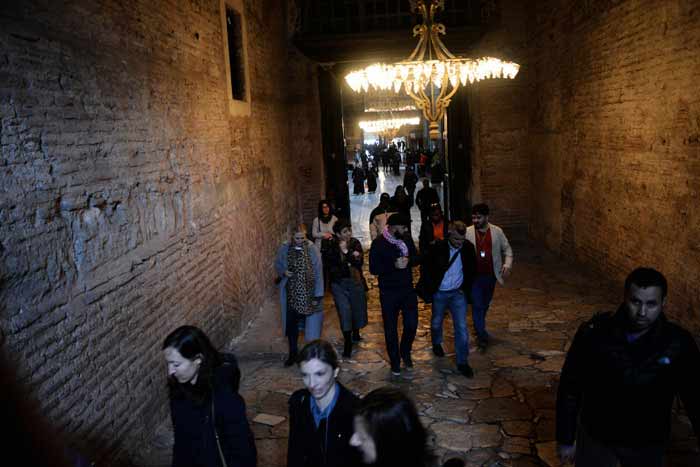Having learned his name, my father was anxious to know whence, from what land he came. I understood this from the names of countries and towns which I caught, and from what my father translated for my mother, giving her a Yiddish version of nearly every phrase. And my mother was quite overcome by every single thing she heard, and Rikel the maid was overcome likewise.
And no wonder! It is not every day that a person comes from perhaps two thousand miles away, from a land only to be reached across seven seas and a desert, the desert journey alone requiring forty days and nights. And when you get near to the land, you have to climb a mountain of which the top reaches into the clouds, and this is covered with ice, and dreadful winds blow there, so that there is peril of death! But once the mountain is safely climbed, and the land is reached, one beholds a terrestrial Eden.
Kind of Fruit
Spices, cloves, herbs, and every kind of fruit—apples, pears, and oranges, grapes, dates, and olives, nuts and quantities of figs. And the houses there are all built of deal, and roofed with silver, the furniture is gold (here the guest cast a look at our silver, spoons, forks, and knives), and brilliants, pearls, and diamonds bestrew the roads, and no one cares to take the trouble of picking them up, they are of no value there. (He was looking at my mother`s diamond ear-rings, and at the pearls round her white neck.)
“You hear that?” my father asked her, with a happy face.
“I hear,” she answered, and added: “Why don`t they bring some over here? They could make money by it. Ask him that, Yoneh!”
My father did so, and translated the answer for my mother`s benefit:
“You see, when you arrive there, you may take what you like, but when you leave the country, you must leave everything in it behind, too, and if they shake out of you no matter what, you are done for.”
“What do you mean?” questioned my mother, terrified.
“I mean, they either hang you on a tree, or they stone you with stones.”
The more tales our guest told us, the more thrilling they became, and just as we were finishing the dumplings and taking another sip or two of wine, my father inquired to whom the country belonged. Was there a king there? And he was soon translating, with great delight, the following reply:
“The country belongs to the Jews who live there, and who are called Sefardim. And they have a king, also a Jew, and a very pious one, who wears a fur cap, and who is called Joseph ben Joseph. He is the high priest of the Sefardim, and drives out in a gilded carriage, drawn by six fiery horses. And when he enters the synagogue, the Levites meet him with songs.”
“There are Levites who sing in your synagogue?” asked my father, wondering, and the answer caused his face to shine with joy.
“What do you think?” he said to my mother. “Our guest tells me that in his country there is a temple, with priests and Levites and an organ.”
“Well, and an altar?” questioned my mother, and my father told her:
“Tarc says they have an altar, and sacrifices, he says, and golden vessels—everything just as we used to have it in Jerusalem.”
Read More about Abandoned part 2








